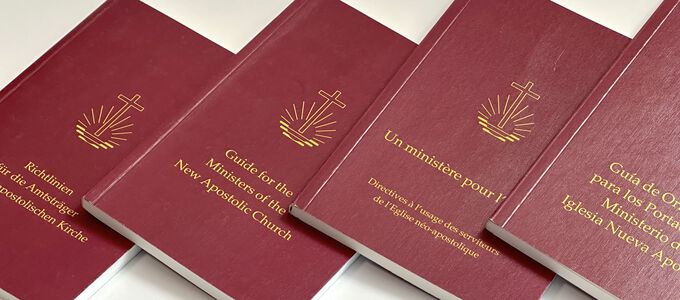Coming soon: a manual for ministers
There are at least three books that ministers of the New Apostolic Church need: the Bible, the Catechism, and the Guide for Ministers. The latter of these works has just been sent to the Regional Churches in order to receive a final regional polish.
It wasn’t part of the plan, but the new collection of regulations is on its way exactly thirty years after its predecessor. And it’s not the first time this has happened, because the main editions date back to the publication years 1933, 1963, 1993, and now 2023.
Valid and binding around the world
As Chief Apostle Jean-Luc Schneider writes in the current foreword, the Guide for Ministers is intended to promote the unity of the Church and provide certainty in Church activities. It represents a globally valid and binding framework that also takes cultural differences into account.
These are guidelines and “not narrow-minded commandments”—which is how the previous versions put it. On the one hand, the manual regulates the duties, rights, and obligations of ministers, both male and female. On the other hand, the Guide for Ministers also addresses the liturgy of divine services as well as the dispensation of sacraments and blessings.
Fully up to date
A great deal has happened since the last edition was published in 1993: in 1998, the Serving and Leading model came into being, in 2007, the Mission and Vision of the Church emerged, followed by the expanded liturgy of the divine services in 2010. The Catechism of the New Apostolic Church was published in 2012, while the concept of ministry was formulated in 2019, followed by the introduction of women in ministry in 2023. In view of all these developments, the Guide for Ministers was updated with supplementary inserts in both 1997 and 2003.
Competency profiles for ministers, teachers, and youth leaders have also been newly incorporated. They describe the core tasks and personal requirements for these functions. While the belief remains that the calling to ministry is based on divine will, the necessary skills should also be taken into account when ordinations and appointments are made.
Committed to protection
Another new element in the manual is that the Church responds to certain social issues by creating appropriate regulations: “The New Apostolic Church strongly disapproves of any actions that infringe upon a person’s sexual self-determination. Protection from sexual violence is a duty incumbent on society as a whole, and the New Apostolic Church and its ministers are likewise committed to this duty,” it says in the Guide.
It goes on to state: “The New Apostolic Church does not tolerate sexual assault by ministers or members in the exercise of their church duties. Well-founded cases of suspicion are to be reported immediately to the relevant authorities established under the laws of the respective country.”
Space for regional matters
The Regional Churches are called upon to issue regulations for the prevention and handling of sexual assaults in pastoral care and for cooperation with state law enforcement authorities. But this is by no means the only matter for which the District Apostles can formulate regulations for regional implementation.
The framework specifications can also be supplemented with detailed regulations that pertain to cultural differences, local living conditions, and the respective state laws. Among other things, these include the areas of music and teaching. This work is currently in progress in the various Church administrations around the world.
Continuity in change
This regionalisation follows in the tradition of previous editions. As early as 1963, Chief Apostle Walter Schmidt already wrote: “Furthermore, local customs must be taken into account in the work of the ministers.”
And the “need to adapt the existing Guide to the present conditions”, as Chief Apostle Richard Fehr put it in 1993, was in view right from the start: “Should improvements or amendments prove necessary, they will be taken into account in a new edition,” says the foreword from 1933, which was published during the term of office of Chief Apostle Johann Gottfried Bischoff.
“While such church regulations are certainly necessary,“ Chief Apostle Schneider writes in the current edition of the Guide, he goes on to emphasise that “love for God and His people stands above everything”.
Article info
Author:
Date:
Keywords:
Andreas Rother
05.10.2023
ministry,
Divine service,
International














